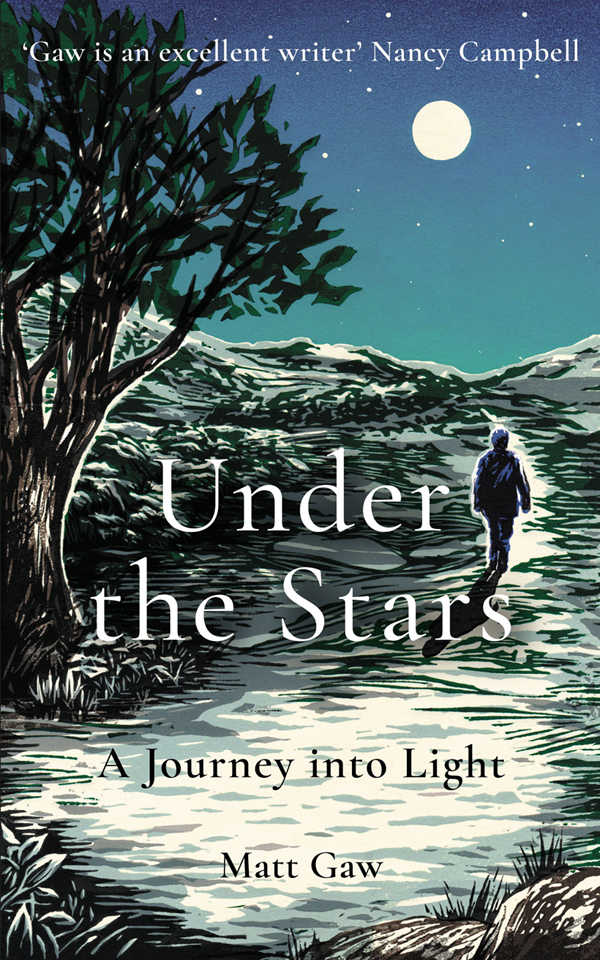In his latest book Under the Stars: A Journey Into Light, Matt Gaw ventures into darkness to explore the pitfalls of our perpetually artificially light-drenched lives. The following extract takes place on the Isle of Coll – an International Dark Sky Community.

The rain has been on and off all day but by evening it seems to have stopped for good. I drive west across the island, heading towards Calgary Point, where the land has been nibbled like an apple to the core, leaving rock and two sweeping beaches. The sun colanders through twists of wire-wool clouds, not drying the land but softening it. To the south I can see the highest peak of Mull, Ben More, cresting between chilly paps of rock. Its north side is snow-covered and barely there against a cuticle-pale sky, yet to be darkened by twilight.
Turbines spin so fast they look as if they could take off and the water of Loch na Cloiche and Loch Ronard rushes with the wind. Sharp wavelets burst white on to thin, brittle-looking peat banks.
I pull over a cattle grid and into the RSPB car park that is also the end of the public road. This is Totronald, one of the other sites that Paula suggested I visit. A place where even the official from the Dark Skies Association had been dazzled by the brightness of the stars. With the moon rising slightly later tonight I’m hoping to have a good viewing window. A sweet spot of deep darkness.
The last of the sunlight slants onto the machair. In spring and summer this landscape is awash with colour, humming with insects, rasping with corncrake. But now, lit by weak sunlight that turns it the colour of weathered copper, it has its own bleak beauty. In all my visits to the Hebrides I’ve never seen it in bloom. For me, machair is a word like tundra – evocative of north, of cold and of dark.
While the corncrake might have left weeks ago to winter in Africa, the geese are here. White-fronted and barnacle. Greylags as big as dogs. They graze on the machair, bark at every unexpected footstep and leave turds like giant green Wotsits curled on almost every track and path.
I walk as the light falls, the signs of night not only in the sky, but in the increasing whiteness of the rocks. They glow like cheap solar lamps in a landscape that is smoothed and rounded by the gathering dark. I find it hard to make out the path. The footworn grass disintegrates into sheep runs, cow paths and the traces of quad-bike tracks. Even after last night I’m surprised at how quickly night rises this far north. The twilights seem to overlap like breaking waves, with astronomical twilight, true dusk, arriving only an hour or so after the sun sets.
The light disappears in a gasp. But returns just as quickly. It is as if a switch has been flicked, or an unseen, silent generator has kicked into life. Mars, hanging red and lonely, is joined by a mass of stars. Not only the brightest: Arcturus, twenty-five times bigger than the sun; Vega, Capella; but a champagne fizz of others that fill the sky.
I walk, stumbling into the dunes, craning my neck to look up, losing my way and direction. I give up and sling down my backpack, getting out my bivvy and sleeping bag.
By the time I lie down, the sky has solidified and set. The stars reach from hill to hill. With not even a hint of light pollution, there is no dead zone. No glowing starless space that reaches from the horizon. Above me, the Milky Way rips the sky in two. A smudge. A chef-ish smear, as if the stars have been spread with the back of a spoon.
It is the clearest view of the Milky Way I have ever seen. It’s hypnotising. Staring into this froth of stars and gas blooms is like looking into the depths of some kind of crystal where the flaws and cuts give the impression of multiple depths, of dizzying trenches, mountain ranges and yawning chasms.
I look through my binoculars, trying not to be overwhelmed by the scale of the starscape. There is an absurdity to it. An existential absurdity which, as Camus said, comes from trying to seek meaning and purpose in a world that is irrational and meaningless. The old dictum goes that it is only the individual who can give both their life and their world meaning. But there is something immensely freeing about being as ‘meaningless’ as the stars.
*
Under the Stars is out now, published by Elliott & Thompson, and is available here, priced £12.99.